
¿Deshumanizará la inteligencia artificial la relación de las ONG con sus públicos?
Agustín Pérez (director de Ágora Social)
La responsable de captación de fondos de una importante ONG española me transmitió su inquietud sobre cómo la inteligencia artificial podía deshumanizar las relaciones entre personas. Aludía al uso de chatbots en sustitución de los chats u otros canales en los que te atiende una persona.
No voy a entrar en el tema específico de en qué casos un chatbot puede resultar mejor o peor que una atención personal. Voy a hacer una reflexión más general sobre por qué creo que la IA es una aliada para mejorar las relaciones humanas.
Las ONG han de comunicarse con cientos, miles o cientos de miles de personas, según el caso. Entre ellas, están los seguidores de sus medios y los donantes, que son los grupos más numerosos. La comunicación con ellos será tanto más significativa cuanto más conozca las necesidades, intereses y preferencias de cada uno de ellos.
El “café para todos” responde a un paradigma del marketing muy anticuado. Recuerdo mi primera época como fundraiser, a mediados de los 90 del siglo pasado, en la que la atracción de donantes descansaba fundamentalmente en las campañas publicitarias y, a medida que estas funcionaban, podías reinvertir parte de los resultados en reforzarlas. Y la fidelización de los donantes consistía en enviar a todos la misma revista y las mismas comunicaciones postales.
Cuando la publicidad convencional dio paso al marketing directo y este se fue haciendo más asequible con la aparición del correo electrónico y el abaratamiento de las llamadas, en paralelo se fue evolucionando hacia un marketing relacional en el que se dividían a las audiencias en segmentos (grupos con características comunes que los hacen propensos a responder mejor a determinados mensajes por ciertos canales).
La inteligencia artificial nos acerca un poco más a esa utopía del marketing uno a uno, en la que adaptamos la comunicación no ya a grupos sino a las personas en su genuina individualidad.
Esto implica conocer a las personas de forma singular. Y la IA, con su gran capacidad para procesar gran cantidad de datos, nos facilita mucho la tarea.
La estrategia de captación de fondos de las ONG se ha preocupado mucho, creo yo, de los canales. ¿Cómo hacemos llegar el mensaje? A veces, incluso a costa de poner los resultados por encima de las relaciones a largo plazo. Me refiero al uso y abuso de la captación cara a cara en la calle y las llamadas telefónicas en frío.
Opino que hoy día es más importante preguntarse: ¿qué mensaje puede resultar relevante para una persona que realmente quiera recibirlo y que se adecúe al estadio de su relación con mi organización?
Para responder tal vez tenga que contestar antes a otras preguntas previas: ¿Cómo creo las condiciones para que las personas quieran implicarse en nuestra causa? ¿Cómo perciben a nuestra organización? ¿Qué quieren? ¿En qué creen?
Porque no siempre quieren lo que tú quieres, no ven lo que tú ves o no creen lo que tú crees.
La IA nos ayuda a conocerlas mejor. A entender qué parte del trabajo de tu organización es la que más les motiva, qué mensajes funcionan mejor, etc.
Me inicié como fundraiser en una organización de derechos humanos con una misión compleja. Hoy día lo es aún más. Tiene afiliados atraídos por ciertas partes de su trabajo y que incluso a veces se dan de baja porque no les gusta algunas de sus tomas de posición. Agrupa a personas de muy diversa ideología que pueden trabajar juntas sobre la base de un mínimo común denominador. Ojalá hubiera contado entonces con herramientas que me ayudaran a entender mejor qué faceta de la labor de la organización conectaba mejor con sus valores y creencias.
Considero que la IA puede ayudar a las ONG a usar de forma más eficiente los canales al uso. Aunque donde puede ser más disruptiva es en ayudarlas a comprender más profundamente a sus seguidores.
Se trata de entablar relaciones de calidad, no de reducir costes para comunicaciones masivas en las que realmente no se conoce a las personas con las que se contacta. En este sentido, la IA, lejos de deshumanizar las relaciones, puede contribuir mucho a hacerlas más significativas.
La entrada ¿Deshumanizará la inteligencia artificial la relación de las ONG con sus públicos? aparece primero en Ágora Social.
NOCHE INTERNACIONAL DE OBSERVACIÓN DE LA LUNA
Sabado, 14 de septiembre - Noche Internacional de observación de la Luna - Bogatell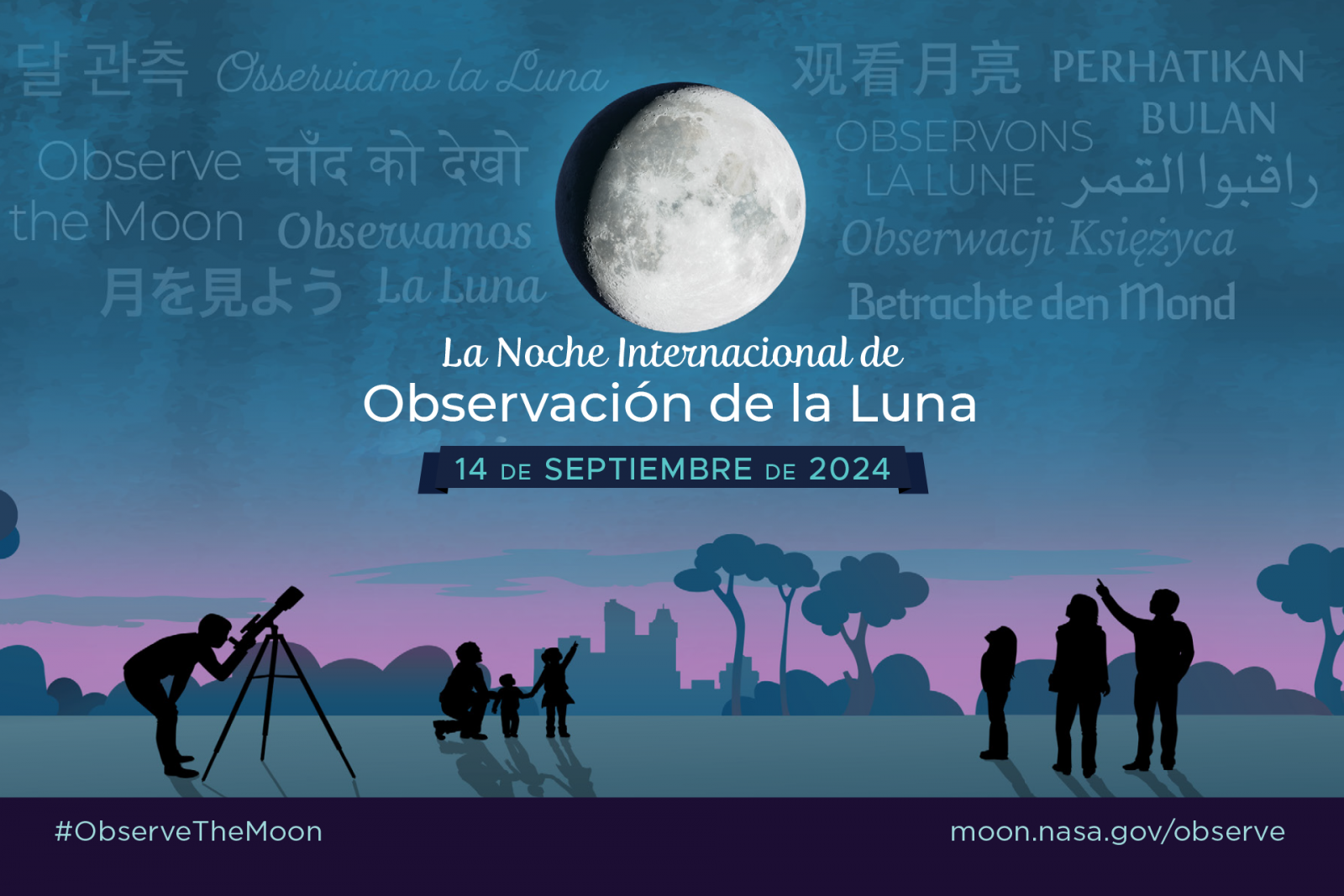
El próximo día 14 de septiembre se celebrará a nivel mundial la Noche de observación de la Luna.
Es una iniciativa impulsada por la NASA y la FAAE, la "Federación de Associaciones Astronómiques Españolas" de la cual ASTER es miembro activo
Con este motivo organizaremos una observación de la Luna con diferentes telescopios, oberta a los socios y a las personas que nos quieran visitar.
La observación es gratuita
La observación será en la platja del Bogatell (al passeig marítim), de les 20h15 a les 22h15
Os esperemos.
Antes de salir y en caso de meteorologia incierta, consultar la web: www.aster.cat

Inspiring Workshops Foster Spiritual Development for Children in Brazil
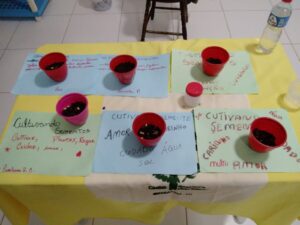
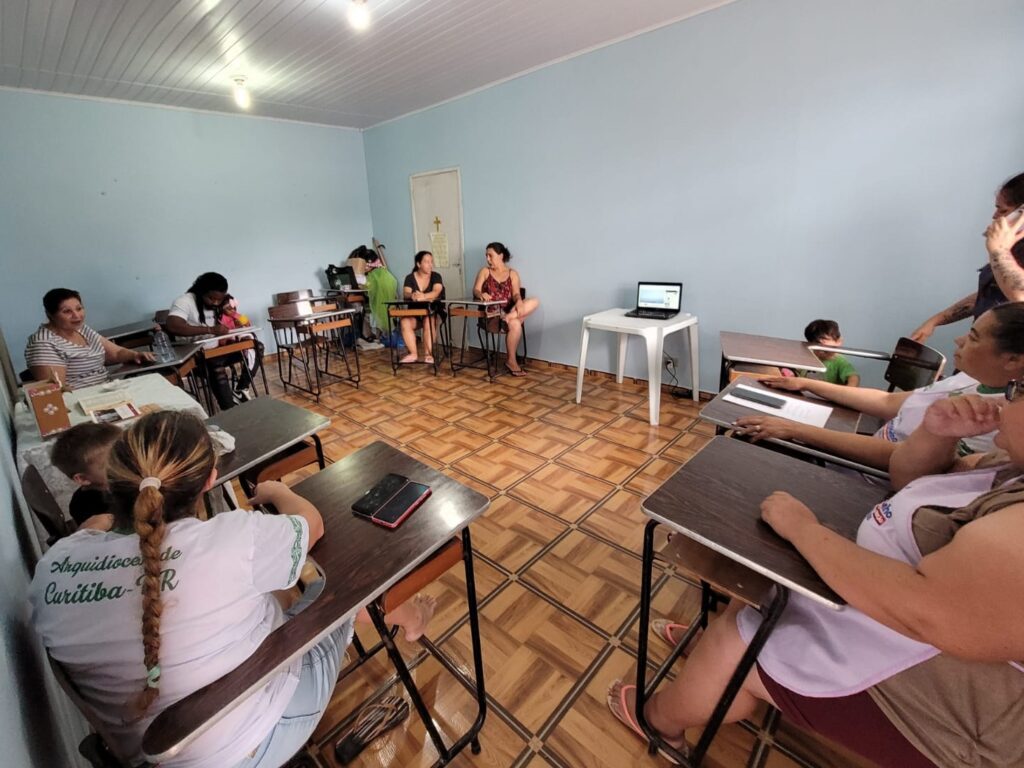
A series of workshops based on the “Toolkit: Nurturing the Spiritual Development of Children” took place in Brazil, bringing together 71 parents and caregivers, along with 121 children. Organized by Pastoral da Criança in collaboration with the Anthropology Departments at the Federal University of Mato Grosso and the Federal University of Santa Catarina, these workshops aim to inspire families to nurture children’s spirituality as a means to protect children from violence and foster their holistic development.
Pastoral da Criança has integrated the Toolkit into their existing program, ‘Celebração da Vida’ (Celebration of Life), which connects families in the community once a month. The program now includes Toolkit activities held twice a month for 90-minute sessions. These sessions, which began in October 2023, are conducted in four locations: Cuiabá, Florianópolis, Guaratuba, and Campo Largo.
The integration of the Toolkit complements existing content as it connects how fostering the spiritual development of children in the family can contribute to creating violence-free environments, developing positive relationships with caregivers, fostering resilience in children, supporting their social and emotional development, and fostering their mental health and psychosocial well-being. With this program, Pastoral encourages vulnerable families to become protagonists in their communities, so that they themselves can be agents of their own transformation.
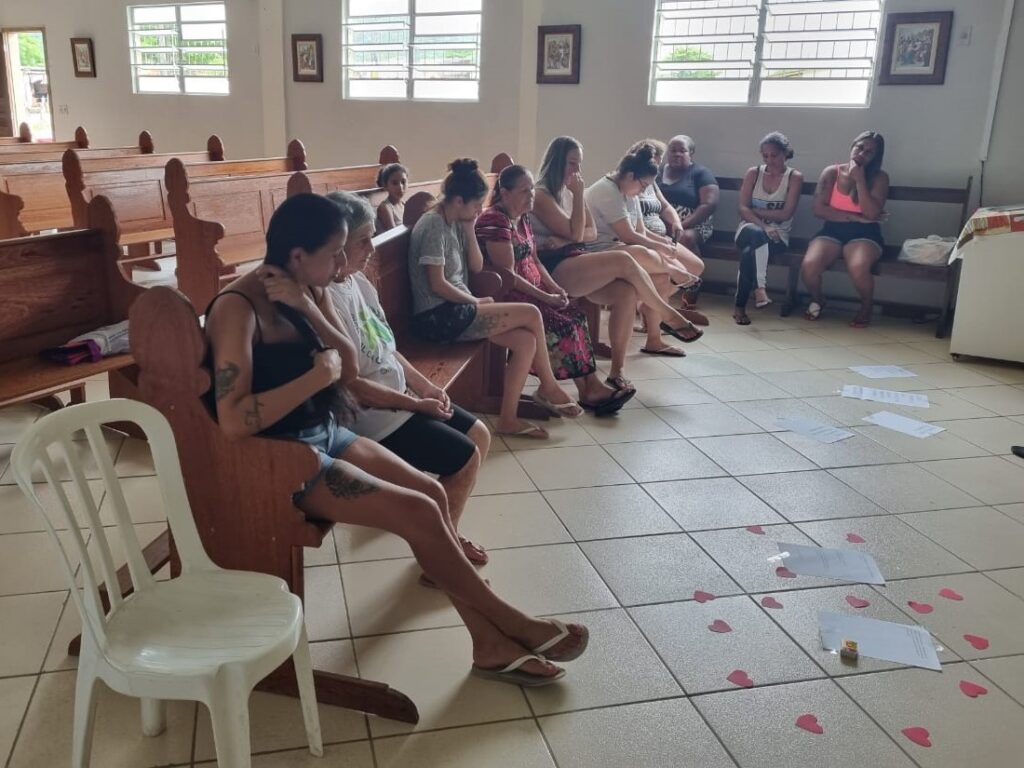
Digital Integration and Accessibility
To ensure broad accessibility, Pastoral da Criança translated the Toolkit into Portuguese and incorporated its content into their Android app. This app provides parents and caregivers with information on health, nutrition, education, and child development, and now it includes a focus on spirituality.
The app has become an essential tool for facilitators conducting home visits and community sessions. It features the learning program, guiding notes, and support materials for meetings with religious leaders. Facilitators can upload session reports, note challenges faced, and use Monitoring, Evaluation, and Learning tools such as registration and parent attendance. This digital adaptation not only reduces the printing costs and environmental impact but also exemplifies how technology and online tools can support the implementation of the Toolkit.
Local Adaptations and Community Engagement
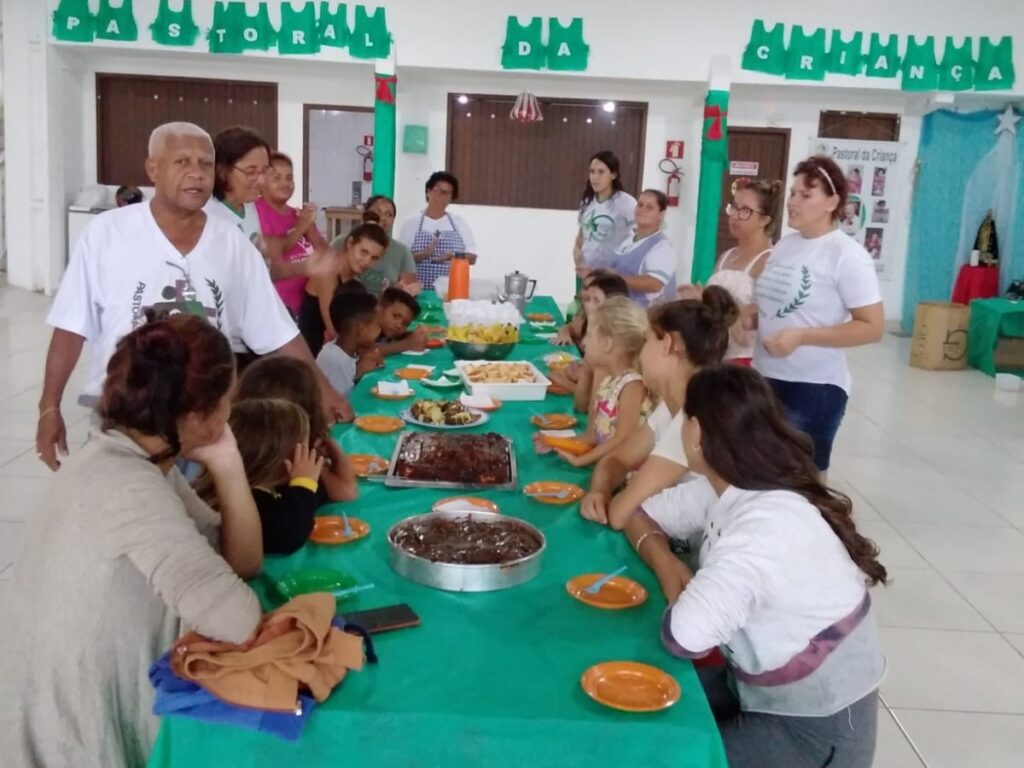
Pastoral da Criança has tailored the Toolkit to address issues specific to their context, such as violence and the lack of play opportunities. “I learned how to deal with playing with children, when it is time to play, and when it is time for duties. I learned to give more love and affection to each one and to understand and appreciate the importance of life,” shared a participant. “With the knowledge I gained from the course, I am now more patient with my daughters,” stated a mother of three. “I spend more time with them, pay more attention to them, and play with them more. As a result, they no longer misbehave to get my attention, which helps avoid stress for both them and me,” she continued while describing how the workshops helped her family strengthen their bonds and improve their relationships.
By forming support networks that include public, private, community, and religious institutions, volunteers and families work together to tackle these challenges. This localized content enhances the relevance of the Toolkit, ensuring it meets the needs of the communities it serves.
In Cuiabá, a Catholic Sister facilitating the sessions noted that parents shared personal stories of neglect and abandonment, highlighting the severe challenges they faced in their own childhood. In Guaratuba, a community leader highlighted that creating a safe and open environment encouraged participation and interaction, emphasizing the importance of setting the right tone for effective Toolkit implementation.
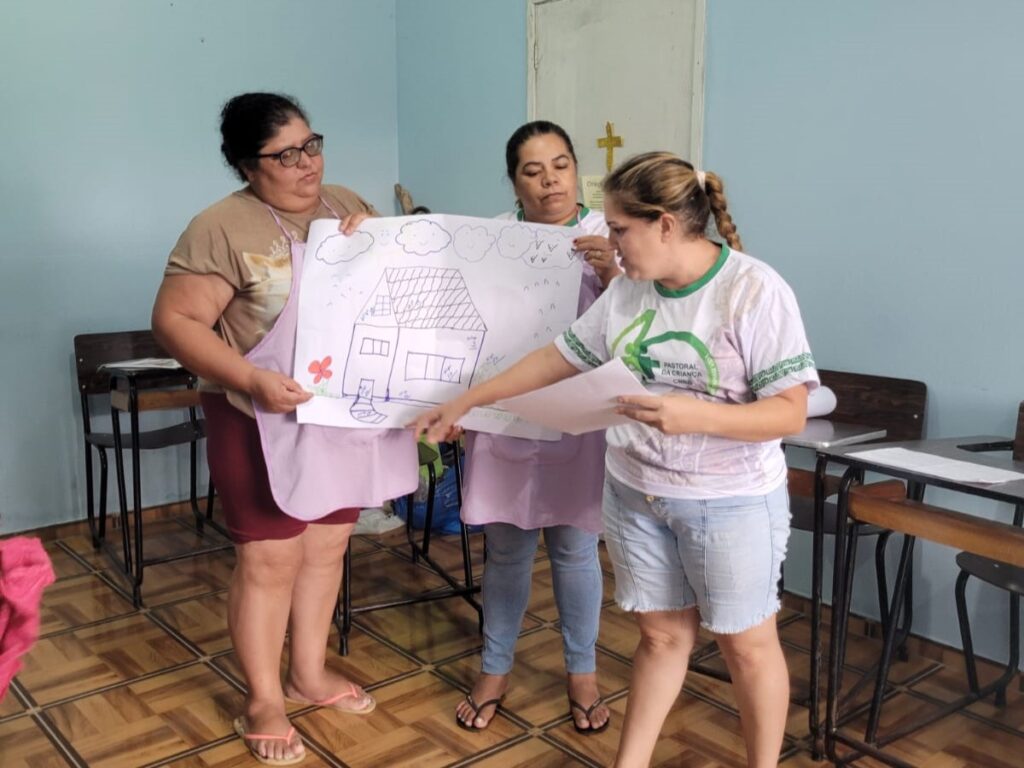
Caroline Dalabona, Nutritionists from Pastoral da Criança explained that “the approach always considers the participants’ opinions and what they have to say without judgment, leading to deep reflection and potential changes in the education and care of children.” The Toolkit addresses positive and respectful child upbringing methods, offering powerful alternatives to physical and emotional punishment, which is often used due to a lack of knowledge or perceived efficacy.
Promising Results and Future Plans
The team in Brazil has customized the learning program to include short activities for parents and caregivers as ‘homework.’ These activities engage families between sessions and promote three key conditions for nurturing spiritual development: safe and violence-free environments, positive caregiver-child relationships, and empowering experiences.
The initial implementation phase has shown promising results in engaging families and fostering holistic child development. Plans for Pastoral da Criança involve expanding these sessions to more families and other locations.
By leveraging digital tools and fostering community engagement, Pastoral da Criança’s innovative approach to implementing the Toolkit provides a model for other regions. Their efforts highlight the potential for holistic child development programs to create meaningful and lasting change in vulnerable communities.
We thank the leadership, staff, and volunteers of Pastoral da Criança, a member of the International Consortium on Nurturing Ethical Values and Nurture Spirituality in Early Childhood and of the GNRC, for their commitment to implementing the Toolkit. Special thanks go to the parents, caregivers and children for participating in the workshops with joy and enthusiasm.
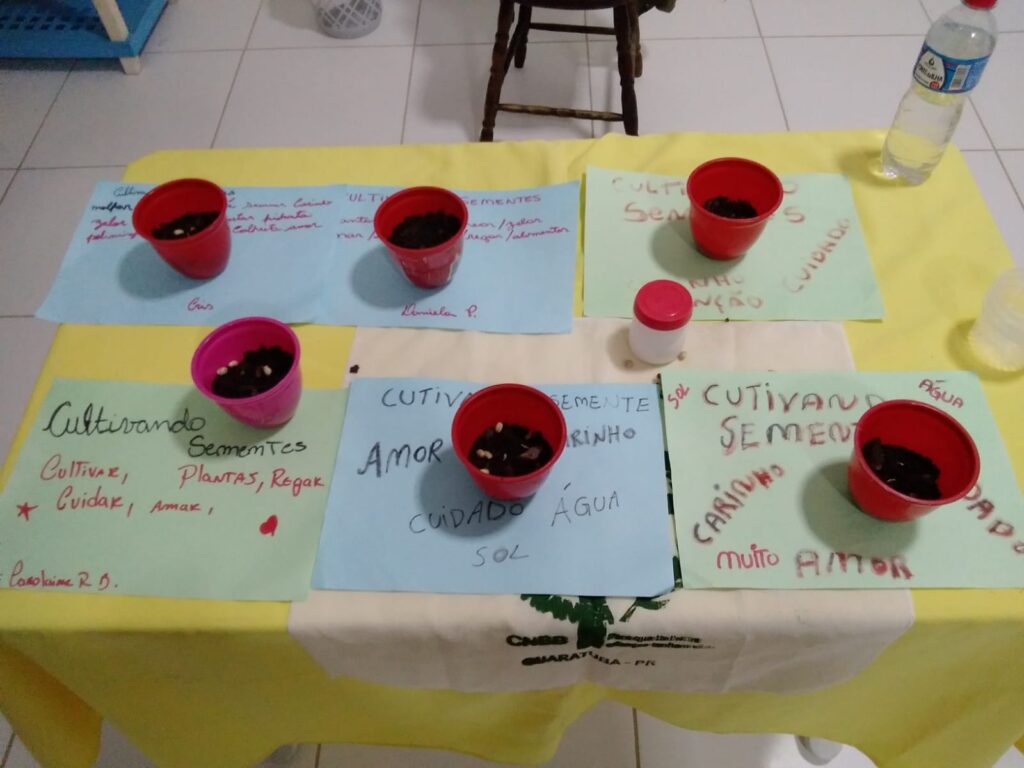
The post Inspiring Workshops Foster Spiritual Development for Children in Brazil appeared first on Ethics Education for Children.

Publicación de la Memoria Anual 2023 y la revista Entre todos Nº35
Puedes consultar la memoria en este link
También puedes leer el número 35 de nuestra revista «Entre todos» pinchando en este link
Reforzamos nuestro compromiso con la transparencia y rendición de cuentas, difundiendo nuestra actividad de cooperación internacional al desarrollo para mejorar la salud en países empobrecidos. A través de esta Memoria Anual 2023.
Un año más, seguimos liderando el apoyo a los centros de San Juan de Dios en los países más empobrecidos de África, América Latina y Asia, a través de la coordinación con los representantes de sus centros sanitarios y otras organizaciones de apoyo de San Juan de Dios en Europa. Esto nos ha permitido mejorar la eficiencia de nuestras actuaciones a través del desarrollo de 36 proyectos, por un importe total de 1,3 millones de euros, de los que se han beneficiado de forma directa casi 300.000 personas. El perfil de los proyectos que desarrollamos se enfoca en el fomento de la Salud Primaria y Comunitaria en las poblaciones de los alrededores de nuestros centros, la Formación Profesional Sanitaria a nuestros profesionales y también a través de nuestras Escuelas de Enfermería en Sierra Leona y Togo, y la dotación de energía solar a los centros sanitarios.
La cooperación para el desarrollo también se realiza a través de aquellas personas que, de forma voluntaria, participan en el intercambio de experiencias y conocimiento, y que apoyan con su tiempo y esfuerzo a las personas más necesitadas. En 2023, han participado 16 personas voluntarias, la mayoría profesionales sanitarios, en 7 centros de 5 países. También hemos organizado 6 misiones médico-quirúrgicas con distintas entidades del ámbito sanitario para atender a las personas más vulnerables en Senegal, Ghana, Liberia y Camerún.
Agradeciendo muy sinceramente tu ayuda en nombre de todas las personas que hemos podido atender, para mejorar su salud y bienestar, recibe un afectuoso saludo de todo el equipo.
La entrada Publicación de la Memoria Anual 2023 y la revista Entre todos Nº35 se publicó primero en Juan Ciudad.

Toolkit for Nurturing Spiritual Development of Children Gains Ground in Mexico
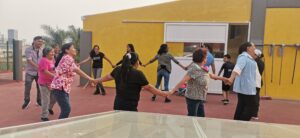
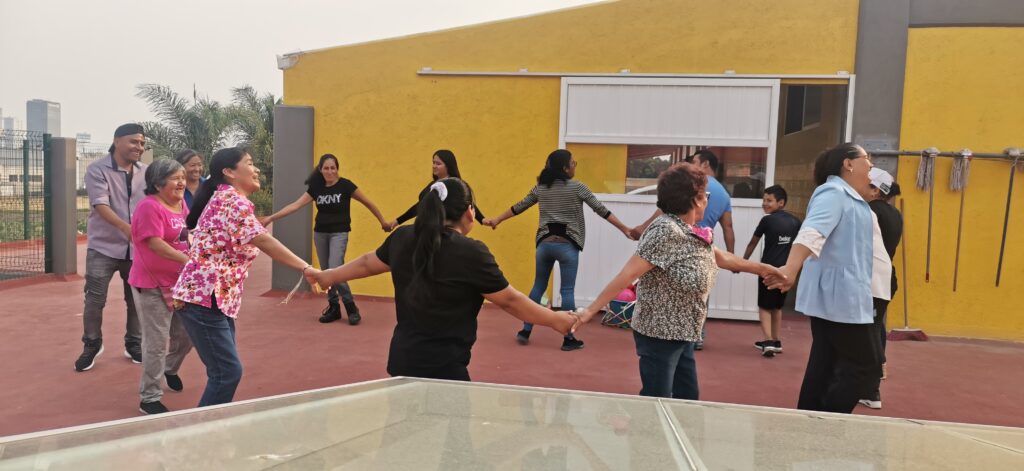
A significant stride in child development and family engagement has been achieved in Mexico with the successful implementation of the Toolkit for Nurturing the Spiritual Development of Children. This initiative, spearheaded by the Franciscan Sisters and World Vision Mexico, has positively impacted over 800 parents and caregivers and more than 1,000 children from July 2023 to July 2024.
The Toolkit has been implemented in various settings across four Mexican states: Guanajuato, Michoacan, Puebla, and Veracruz, including schools, an orphanage, and community parishes. Both organizations reported high levels of participant engagement, showcasing a promising start to this comprehensive program.
Training and Implementation
Following the Training of Trainers workshop in June 2023, several Facilitator Training Workshops were held to cascade the program. Taking place from August to October 2023, these workshops prepared organizational staff, faith actors, and religious leaders with the necessary knowledge and skills to carry out workshops with parents and caregivers. The training emphasized the importance of spiritual development for children’s holistic growth and well-being, and how this can protect children from violence in their early years.
As part of these workshops, facilitators also developed action plans to adapt the Toolkit to local contexts. An additional request from World Vision’s trainers led to the creation of simplified materials to accommodate parents and caregivers with lower literacy levels.
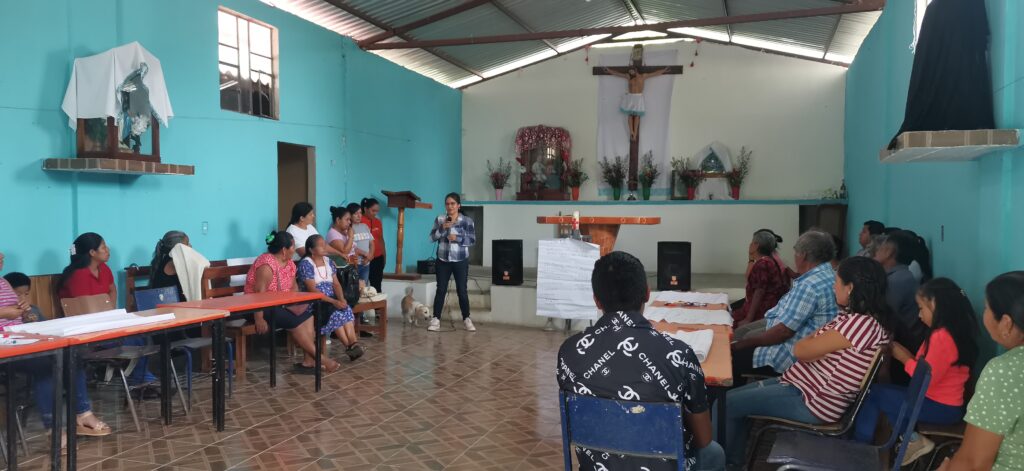
High Engagement and Positive Feedback
The Franciscan Sisters integrated the Toolkit into their “Escuela para Padres” (Parents’ school), conducting sessions in four schools and an orphanage. This effort involved 20 trained facilitators working with 200 parents and caregivers and reaching 400 children.
The sessions, held bi-weekly and monthly, have witnessed high levels of participation and enthusiasm. One of the most significant outcomes for parents and caregivers is their newfound recognition of spirituality beyond religion. Additionally, the workshops have been instrumental in helping them reduce the use of violence in raising their children.
“The Toolkit is practical and easy to adapt, helping to employ new strategies for parenting and education,” noted one of the facilitators. Parents have expressed gratitude for the insights gained, especially regarding their own childhood behaviors and how these influence their parenting styles.
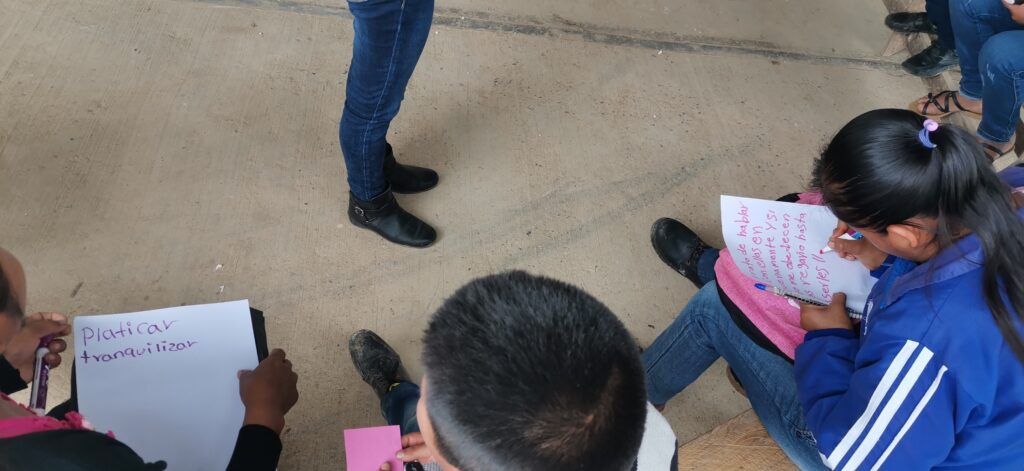
Diana, a mother who participated in the program, shared, “This has helped me a lot to have a better connection with my children, to understand them, and to understand myself. I now try to be a better person so that I can be a better mother.” “The workshops helped me tremendously in many ways. For example, I am no longer as harsh with my daughter; I try to be more empathetic towards her, to listen to her, to spend more time with her, to understand her, and not to be so explosive or bossy,” said another participant.
World Vision Mexico also integrated the Toolkit into their existing work with religious communities. They trained 90 faith actors working in rural communities as facilitators. These facilitators, primarily catechists, have been conducting sessions in six parishes, engaging 600 parents and caregivers with a 98% attendance rate.
Facilitators from World Vision reported a high level of enthusiasm and engagement from the parents and caregivers, despite location and language barriers. These parishes are hard to reach and often spread far from one another, with some parents and caregivers traveling by foot to the sessions. Additionally, many participants are from Nahuatl indigenous communities, most with lower levels of Spanish as this isn’t their native language. Despite these challenging circumstances, there has been a higher number of participants than predicted, with some sessions attracting up to 60 individuals.
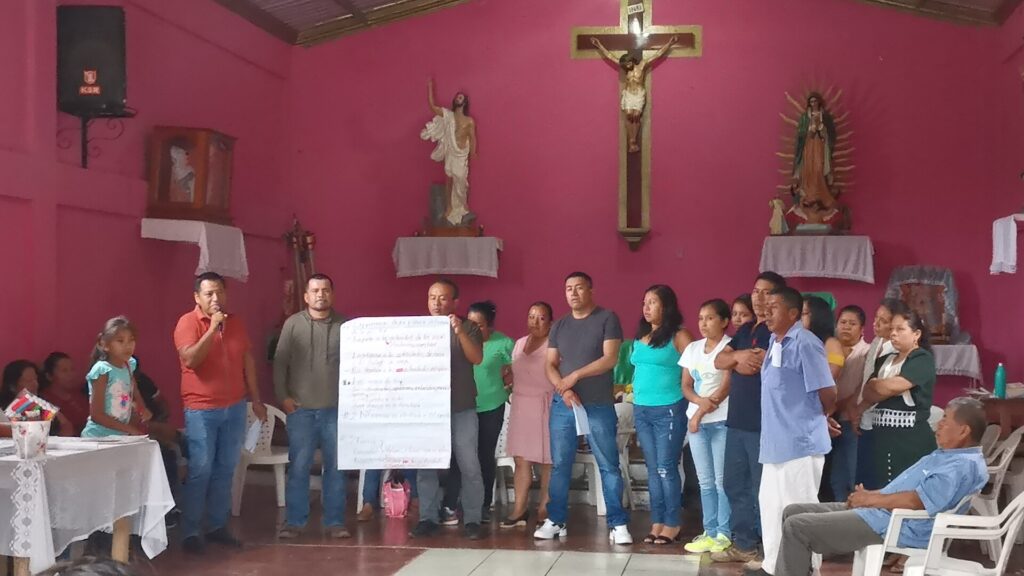
One notable outcome of this group has been the active participation of fathers, which is usually rare in such programs. “My children have noticed the difference in how we treated them before the workshops and now that we are participating in the workshops,” stated a father from Veracruz, illustrating the impact of the program on his family. “Before, I used to get angry when the girls didn’t do something, and now I understand them more. I have more patience with them, I understand that they miss their mom, and I must fill that role,” added a single father of tween girls.
Impact and Future Plans
Both organizations have seen the Toolkit’s positive impact firsthand. The Franciscan Sisters have noted that the Toolkit complements their existing work and has enriched their parenting programs. The Sisters hope to scale up implementation to the other thirteen schools they operate after this pilot phase.
Similarly, World Vision Mexico’s facilitators reported that the Toolkit has helped parents and caregivers in rural parishes strengthen their spirituality and better understand their roles in nurturing their children’s development.
The successful implementation of the Toolkit for Nurturing the Spiritual Development of Children in Mexico was made possible with the support of Porticus. This initiative signifies a robust approach to supporting diverse families and communities. The engagement levels and positive feedback from both parents and facilitators underline the effectiveness and necessity of such programs. As the initiative continues to evolve, it holds the promise of strengthening parenting skills and supporting children’s holistic development and well-being.
The post Toolkit for Nurturing Spiritual Development of Children Gains Ground in Mexico appeared first on Ethics Education for Children.






